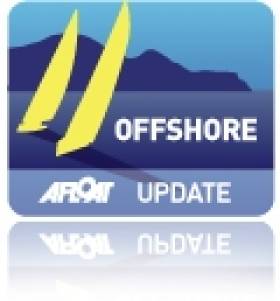Displaying items by tag: Paprec
#Mod70 – In the second dramatic capsize of a MOD70 trimaran – the first on Dublin Bay in June – French skipper JP Dick has been rescued by helicopter after his giant trimaran flipped in a training run.
In similar circumstances to the Dublin Bay capsize of Spindrift the Tri appears to have been blown over in a gust of wind. After the gust hits, the 70-footer sails along for several seconds on its leeward hull before finally capsizing, smashing its carbon mast as it fully inverts. One crew can be seen falling from the hull into the water.
Jean-Pierre Dick and Roland Jourdain were on board Virbac-PAPREC 70 off Belle Ile, practicing in 15-20 knots of wind for this month's Transatlantic Jacques Vabre race. According to reports from the professional French racing team the boat 'turned suddenly' and capsized. A Helicopter and lifeboat lifeboat retrieved the crew and boat. Below are vids from both the leeward side of the hull and from the rescue helicopter.
On June 22, the race-winning multihull Spindrift capsized in gale force winds off Dun Laoghaire at the start of the Route des Princes series of inshore racing spectacle on Dublin Bay.
That accident happened about 700 metres off the starting line as the fleet of five MOD 70s were accelerating in the strong and gusty winds. The boats were not carrying full sail as a precaution against the strong offshore winds blowing in the bay that day.
View from inside the leeward hull
Heli rescue - JP Dick injured





























































